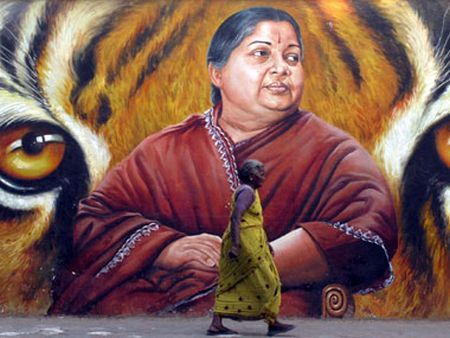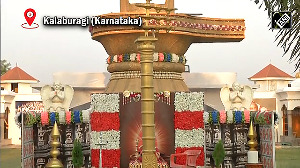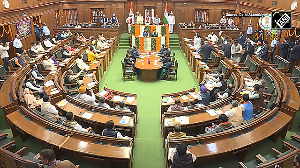 Should the Karnataka high court deliver a verdict in the Jayalalithaa case on Thursday, the Supreme Court bench on Friday could pass orders in her bail extension plea that may end up staying the former ruling, reports N Sathiya Moorthy.
Should the Karnataka high court deliver a verdict in the Jayalalithaa case on Thursday, the Supreme Court bench on Friday could pass orders in her bail extension plea that may end up staying the former ruling, reports N Sathiya Moorthy.
In what is not a wholly unexpected development, the two-judge bench of the Supreme Court on Wednesday gave a split verdict over the legality of special public prosecutor R Bhavani Singh appearing in the already-concluded ‘Jayalalithaa assets case’ appeals hearing in the Karnataka high court, and directed that a larger, three-judge bench should hear the same now.
In doing so, Justices Madan B Lokur and R Banumathi granted liberty to the high court’s Justice P R Kumaraswamy to decide for himself on delivering the judgment that he had reserved after the completion of the trial. With the first bench of the Supreme Court seized of the pending bail extension application of Jayalalithaa and her three co-convicts in the case, due for hearing by April 17, it remains to be seen if Justice Kumaraswamy would proceed with pronouncing the verdict in the one day available in between, that is Thursday, or wait for the superior judicial authority to indicate directions, if any, as has been customary.
Apart ‘freeing’ Justice Kumaraswamy from the brief stay that they had granted, the SC judges concurred on another issue, too. Both held that DMK general secretary K Anbazhagan could not implead as an interested party, after the Supreme Court had earlier permitted him to ‘assist’ the prosecution in the sessions court trial, acknowledging his petition as the cause for transferring the pending trial from Tamil Nadu to Karnataka.
The judges also made a pointed reference to the undue delay in the lifetime of the case. Justice Lokur in particular hinted to the play of extraneous power for 15 long years of delay. Incidentally, at least 10 of those years were spent in the Supreme Court itself hearing out interlocutory petitions from one or the other of the accused persons, after directing the transfer of the trial to Karnataka and ordering the trial court to complete the case without further delay.
In political terms, the ruling All India Anna Dravida Munnetra Kazhagam in Tamil Nadu may have hopes of an early return of Jayalalithaa as chief minister, based on the premise that she could get an unqualified acquittal, if and when the two-judge SC bench cleared Bhavani Singh’s continuance as public prosecutor for the appeals cases, too. The party had also indicated to its cadres about the possibility of snap polls to the state assembly any time soon, ahead of the scheduled May 2016 deadline. Both would have to wait, if at all.
Today, there are more legal questions before the AIADMK than answers. Technically again, should Justice Kumaraswamy pronounce a verdict on Thursday, unless directed otherwise by the Supreme Court, the SC Bench hearing Jayalalithaa & Co’s bail extension plea on Friday would also have to pass appropriate orders, based on appropriate petitions, which may have the effect of staying the same.
The question would relate also to the relevance of the Kumaraswamy judgment on the case should a three-judge Supreme Court bench uphold Bhavani Singh’s appointment.
The ‘split verdict’ itself came only three days before the Supreme Court-set deadline for the high court to pronounce its verdict, and for the special bail granted to Jayalalithaa and others to expire, on April 18. With the result, Jayalalithaa’s anticipated petition for extension of the bail period is likely to come up before the first bench, chaired by Chief Justice H L Dattu, any time sooner.
Going by precedents, the SC may extend the bail to be able to coincide with the additional time that the larger bench of the court may need to dispose of the matter flowing from the ‘split verdict’. The question would arise if a Kumaraswamy verdict were to uphold conviction for the accused, and pass appropriate orders on penalty, too.
Technically speaking, unless elevated to the Supreme Court, which would give him three more years of judicial service, Justice Kumaraswamy would attain the age of superannuation of 62 years for a high court judge in August this year. Should he not deliver his ‘reserved’ verdict on Thursday after appropriate notification to the lawyers appearing in the case, the chances of his having to hear the case once again would arise should the SC hold Bhavani Singh’s HC appointment illegal and/or unconstitutional.
Any SC verdict that reopened the appeals case in the high court could thus mean delays in the form of the Karnataka government having to name a new public prosecutor, who would then require time to study the case and also a new judge, who would also require time.
Unless the appointment of a new PP and the time sought by him for studying the case afresh are not telescoped, the chances of Justice Kumaraswamy being able to dispose of the matter within a three-month time -- the time-frame originally fixed by the SC for the purpose -- could become remote.
This is also because the high court would be shut for the annual summer vacation through May, and the new PP and members of the legal fraternity involved in the case should be willing to work through the vacation period. Ditto with the Supreme Court’s larger bench hearing the ‘split verdict case’ after it had adjourned for summer vacation from May 17 to June 30.
The emerging situation would thus entail the appointment of not only a new bench in the Supreme Court, but possibly also a new judge to hear the case -- should the former, yet to be named, does not complete the hearing in the ‘split verdict’ case early on, and pronounce its verdict before the summer vacation commencing on May 17. Ironically, it would imply that like trial judges in Tamil Nadu and Karnataka other than Judge D’Cunha, who finally pronounced the verdict, Justice Kumaraswamy too would have heard the Jayalalithaa case without passing – or having to deliver -- the verdict, even after concluding the original hearings.
At 92-plus -- two years older to party chief M Karunanidhi -- Anbazhagan may possibly be the oldest litigant-politician to knock at the doors of the Supreme Court. The recently-ailing Dravidian ideologue and the closest and longest serving top-most aide of Karunanidhi since the latter took over the party reins as far back as 1969, Anbazhagan had gone to the Supreme Court after Jayalalithaa returned to power in 2001, seeking the transfer of the ‘wealth case’ trial to another state.
The Supreme Court thus transferred the case to neighbouring Karnataka -- the Union territory of Puducherry comes under the jurisdiction of the Madras high court -- directing the state government to appoint a public prosecutor in consultation with the high court there. The SC also granted Anbazhagan’s another plea to assist the PP without in anyway declaring how, how much and how not.
The chequered history of the trial had since witnessed any number of interlocutory petitions, mostly preferred by the accused and going up to the Supreme Court on most occasions, transfer of trial judges and the resignation, in publicised frustration, of the original public prosecutor B V Acharya, until it fell to the turn of judge Michael de Cunha and PP Bhavani Singh to dispose of the matter in their time.
Just as the trial judge was being showered with praises for his ‘bold’ and ‘no-nonsense’ verdict, quizzical looks were being thrown at Bhavani Singh for the way he conducted the trial, accepted the brief of the prosecuting agency in Tamil Nadu without possible -- though not mandatory -- reference to or by the Karnataka government or high court, his appointing authorities in the first place -- and also the later-day conduct of the appeals proceedings.
In the first place, neither the high court bench, nor Bhavani Singh in particular, seemed to have considered the Supreme Court’s basic approach in transferring the trial out of Tamil Nadu.
The SC’s rationale, based on Anbazhagan’s petition, that the ‘accused’ as the ‘prosecutor’ could influence the trial in Tamil Nadu would have been equally applicable to the same political party being in power at the time of a state government agency appointing Bhavani Singh as PP for the appeals case as well.
Going by media reports, Justice Kumaraswamy was purportedly harsh on Bhavani Singh for near-consistently pleading ignorance to many of the queries from the bench, that too when the TN government claimed that his choice proceeded from his experience in handling the trial earlier.
Independent of the SC order and the HC verdict, the ‘Jaya case’ has since attracted political attention for the wrong reasons. Both Karunanidhi and Pattali Makkal Katchi founder S Ramadoss have taken exception to the Saturday night transfer of Karnataka Chief Justice D H Waghela to the Odhisa high court.
According to local media claims, Justice Waghela had reportedly resisted the transfer to a ‘smaller high court’ for weeks now, before the Supreme Court collegiums, chaired by Chief Justice Dattu, decided on the transfer after granting Waghela’s reported request for two months’ time, to complete some ‘important work’ in the Karnataka HC.
In a public statement, Karunanidhi has questioned the need for such urgency to notify the transfer, cleared by the Union law ministry and ordered by President Pranab Mukherjee, when the government was to notify the NCJA Act for judicial appointments a day later, and the Supreme Court was to pass its orders on Anbazhagan’s petitions another two days later.
PMK’s Ramadoss has gone one step further and demanded the withdrawal of the transfer order. Sections of the local pulp media have since begun their tiring and even more avoidable speculation in the matter. With the Andhra Pradesh police killing of 20 persons from Tamil Nadu still making for controversial news in the state’s Tamil media in particular, the CJ transfer ‘story’ has thankfully been relegated to inside pages, if it has at all been covered.
N Sathiya Moorthy, veteran journalist and political analyst, is Director, Observer Research Foundation, Chennai Chapter.











 © 2025
© 2025